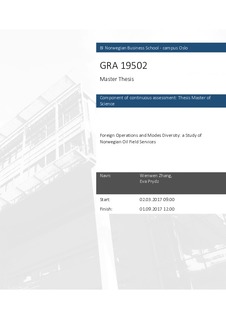| dc.description.abstract | This study takes a critical look at both how firms configure their foreign
operations in the global market place; and the rational for and impediments behind
the dynamics of mode configurations. The data analysis draws mainly on dynamic
foreign operation modes theories based on two controversial perspectives—
economic perspective and internationalization theory. This is complemented with
research on an activity based perspective, in the field of global value chains and
factories. This research applied a mixed method by providing a quantitative
overview of mode configurations in Norwegian Oil Field Service (OFS) industry,
with further in-depth qualitative case analyses on OFS firms’ foreign operations.
The findings of this research indicate that certain types of activities tend to
favor specific mode configurations, where knowledge intensive activities drive the
foreign operation mode diversity on both location and activity levels.
Additionally, a lower degree of ownership is correlated with the diversity of
modes, especially at locational level. Moreover, by considering the foreign
operations as a three-dimensional construct (i.e. activity, location and corporate
governance), managers may gain a more clear and structured picture of their
foreign operations. It is also stressed that foreign operations must be viewed over
a temporal dimension as it is subject to continuous circumstantial changes. In turn,
having a full understanding of how to configure foreign operations across the
three dimensions over time might entail a competitive advantage. While this paper
only found a correlation between the locational dimensional construct and firm’s
performance, further investigations on performance is highly warranted and called
out for by the authors. Moreover, some important characteristics of OFS steered
the firms to build strategic flexibility into their foreign operations. This might be
linked with the highly increasing trend of contractual modes usage; while the
firm’s operations remain diversified in their mode packages. Besides, flexibility in
foreign operations might help managers mitigate issues, such as lock-in effects
and mode inertia.
In sum, this paper comprehensively investigates foreign operations and mode
diversity of OFS firms. The study also tries to encourage further research in
cleaning up the somewhat “messy” reality of foreign operation modes and their
configurations. | nb_NO |
